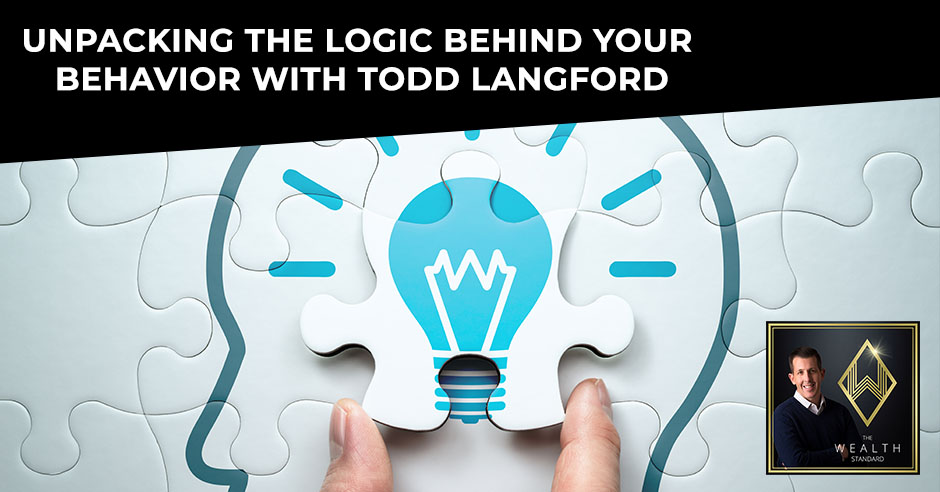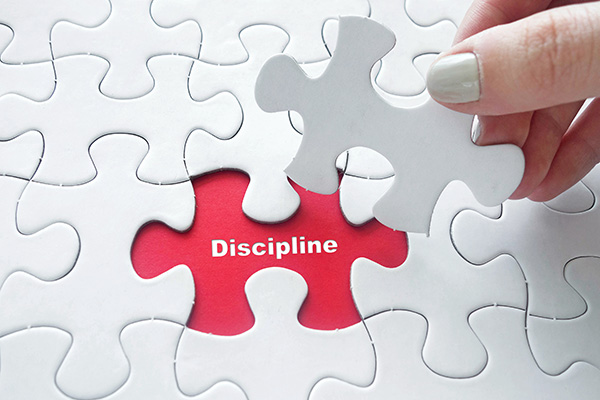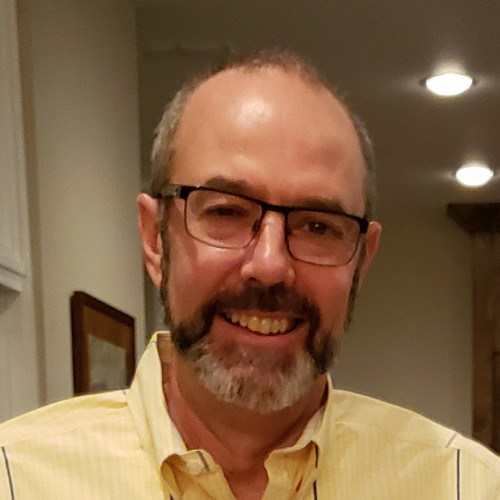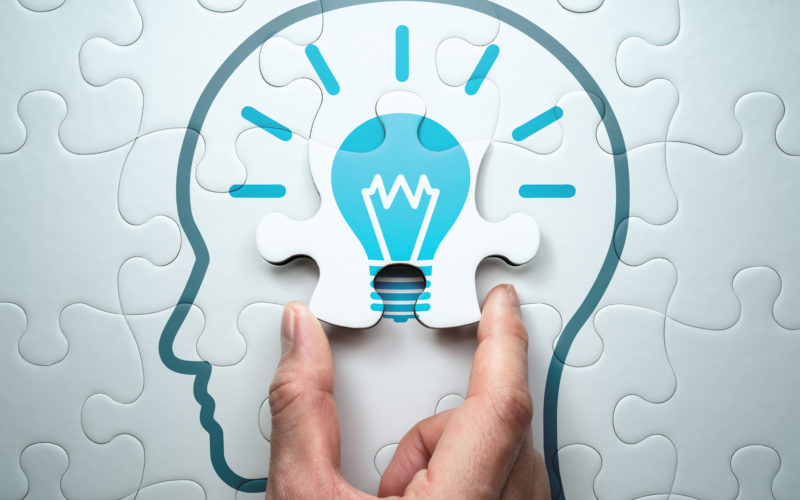Unpacking The Logic Behind Your Behavior With Todd Langford
Podcast: Play in new window | Download

Often, what we have in our mind as to why we’re doing something usually isn’t the core reason we’re doing it. You have to ask yourself several layers of questions to get to the real meaning behind your decisions. In part 6 of this series, Patrick Donohoe and Todd Langford discuss how you can unpack the logic behind your behavior to understand what drives you and reveal what it is you truly want. When you see that, you can figure out a path to get what you’re truly desiring.
—
Watch the episode here:
Listen to the podcast here:
Unpacking The Logic Behind Your Behavior With Todd Langford
I spent four days getting my psychology dissected by one of the most decorated Navy SEALs in history. It’s a mind-blowing experience. Of the myriad of takeaways, I wanted to share what I consider the most applicable to this segment with Todd Langford. First, at the core of human consciousness is a mechanism and this mechanism is designed to keep us safe and alive. As we experienced life, this mechanism unconsciously observes the environment around us and influences the majority of our behavior. What I became even more aware of is the character of this lens, mainly how old it is. This mechanism, which is our subconscious mind, has not evolved at the pace of our environment. It still operates to some degree as if there is a tiger hiding in the bushes, ready to attack.
The subconscious programming is constantly running in the background and hasn’t had its program updated in quite some time. This subconscious lens sees a stranger on the street and concludes if it’s a tiger. It sees someone who looks and sounds different and says, “Beware. Warning. It’s a tiger.” Here is someone who makes a statement that is contrary to our beliefs and says, “Warning, tiger.” Our subconscious is always on guard and it’s there to protect us from not being hurt and to keep us alive. My question to you is what are you wrongly identifying as a tiger in your life, mainly in your finances? What are you afraid of? What are you doing or not doing because you are so scared? Let’s get to the next segment with my friend, Todd Langford.
—
Based on what you said, on the surface, it seems like money is the only thing that you can manage, which may be true, but without the context of the purpose of that money, I believe that it’s false because what people want money for is in paper. They don’t want numbers. That doesn’t do anything for you. It’s the meaning behind that that does something. I will give you an example where I gave my wife, Cynthia, a budget for a vacation. I thought we are going to drive down to St. George. Maybe we can go to Phoenix. She was able to make Mexico City work, an entire week with drivers and we stayed at the Four Seasons. It’s one of those things where it’s not the money necessarily. It’s what the money can buy.
It’s elusive sometimes when we think we need this amount of money. We think we need to save this much and earn this interest and have these milestones. We do it with a certain set of assumptions and variables that are likely not the best variables. They could be good variables, but they are not the best. What are the best variables and how do you discover them? That is where I would say it’s the logical identification of, what are you doing? Why? What are the alternatives and what is it going to take?
If we enjoy life now, we're probably going to be a lot more productive and be able to hit our goals in the future as well. Share on XThe critical piece is digging through that one. We have talked about this quite a bit in the past. It’s the idea that the initial reason that somebody has in their mind as to why they are doing something usually isn’t the core reason why they are doing it, especially the first one that they share with somebody else. You have to ask yourself several layers, “If I got what I want, what would that mean?” That is the key piece. Why do we want the cabin in the woods? Is it the physical structure or is it the fact that we can be together with the family and experience stuff in the outdoors? We can be separated from the rest of the noise that is going on for a period of time, communicate and be together in fellowship.
It’s the real meaning behind all those things that a lot of people stopped short of looking at it. The results are people buy things thinking it’s the thing. Because their neighbor bought a new boat, they want to buy a new boat. The neighbor bought the boat to experience stuff with their family. This guy bought the boat so that he could keep up with his neighbor. Instead of having a real meaning behind it, it falls short. When they get it, they are miserable, “I spent all this money and it didn’t do anything for me.” I think you see a lot of people in that scenario where they have spent a lot of money on stuff, but they bought it for the stuff and not for the meaning behind it.
Again, going to the logic side of things, it’s the questioning of assumptions, but it’s also the questioning of associations, which comes down to doing this in order to produce that and what that associated meaning is. I think you have productive ones and unproductive ones. What came to mind when you were talking is, how many people don’t make decisions because of inaccurate, slighted or partial assumptions? How many people make decisions or don’t make decisions? As a financial advisor, I have worked with younger people, not married or people that are married that haven’t had kids. I get to know them. Sometimes the conversation comes up, “Are you dating? How long you have been dating, 5 years, 6 years? Six years? Why haven’t you gotten married?” “We don’t have enough money.” I’m like, “What’s enough money?”
There are these rules associated with, “I have to have this and this in order to do this.” It’s like, ”No, you don’t, just do it. Many people have done it and they are very happy.” It’s one of those things where going back to rules and what is the driving force behind the behavior. What do you truly want? Equally, I have worked with clients that have lots of money and don’t need to invest or work but have a rule associated with they have to. They have to invest because if they didn’t, then this, even though they don’t have to. It’s the unpacking the logic and understanding what drives you, which is relative to people. At the same time, there is a role, math, logic and science in play. There is also some non-constant that it’s evaluating. That might be how we conclude this. Is it true that the role of math and science is to evaluate as opposed to hypothesize?
I think so. We can say, “I think it will come out this way,” and then use the math to see if it fits. I have done that many times. I have an idea of what the results of a certain mathematical set of formulas and things are going to be and oftentimes, I’m shocked with what the results are. Now I have a choice of saying, “Throw the math out because I liked my hypothesis better.” I can say, “Let me dig in and find out why it did something I didn’t expect it to do.” I can learn something new and maybe a new direction, a new place to go, which is hugely beneficial. Probably the bigger thing is to be able to prove a decision that you already want to make, as long as you are open-minded and you have that discipline that you are willing to accept whatever the truth says. It’s not necessarily the math, it’s what the truth is.
You can throw a hypothesis out there, something that you want to happen, but you have to be willing to say, “Let’s see what it’s going to take to get there. Let’s see if this works and be okay with what the results of that are.” Since we are driven by emotion, it’s very hard to go against what we want to happen. It’s very hard to go against our beliefs but that is where the discipline comes in. If we want to be successful, we have to do that. One of the things that my wife, Kim says when she is talking to people, a lot of times people will say, “We want such and such, maybe for a great cause to be with our family, to do certain things, to be generous to other people, whatever it is, but we can’t afford it.”
I hear it constantly with advisors and with clients, turning that around and saying, “Let’s not approach it as, ‘We can’t because.’ How about we start with, ‘Let’s see how we could make that happen?’” It’s a whole different thing. It opens up your mind to, “What if we did this? What if we didn’t do that because we want this to happen and we focus this there?”A lot of times, we can figure out a path to get what it is we are truly desiring if we don’t shut down from the surface and decide, “No, it can’t happen.”
I also think it helps with non-decision as well. I think people have come to this like, “I can’t do that. I can’t do this. I shouldn’t do this or I shouldn’t do that.” Again, going to the marriage story or having kids. If you want to have kids, there is no rule of how much money you have to have in order to have a child. In fact, having a child could greatly amplify your ability to produce and make more money. The point you made where people have to have these dreams or have these things that they want in the future, or if it is possible to have it right now. When you evaluate that, when you logically understand what it is you truly want. It’s not a trip to Rome. It’s a special time with your spouse.
It’s not to live in this place or this neighborhood or that. It’s to live in a place where you’re able to have amazing experiences with people. If you identify how simple things could be from an end standpoint, I think we complicate the means. I believe that if you achieve those ends with uncomplicated means, it gets you more of what you thought was complicated, to begin with. It maybe trips with a spouse, wanting to experience some amazing place, go on this amazing European vacation, go around the world. What you want in the end is to have great experiences with your spouse.
You can go and have a great experience by taking a hike on a Sunday, which costs zero. It’s one of those things where when you experience that, now you can experience something more trivial that gives you even more meaning and more. What that does is it gives you a sense of fulfillment in life that affects your work, your wherewithal, your relationships. It gets you closer to wanting to do that European vacation because here’s the thing, you have this big dream in front of you. All of these things have to line up in order for it to happen. What is your experience like once you’re there? You’re a wreck because it’s going to end. It’s the time side of things. It’s like, “We had to get up early. We got to go here. We got to do this.” You’re both miserable by the time the vacation is over.
The same thing happens on the other side and that is what you are talking about. You are miserable, “I want to go on this vacation with my wife but I don’t think we are ever going to be able to afford it.” You are miserable the whole time without opening your mind up to the things that you can do right now in between. People don’t take seriously the idea of mindset and what impact that has on your ability to do that. Going back to your vacation example, “I can’t do it.” You go to work that way. You’re slugging through another day, “I won’t make enough here to be able to go on that vacation.”

Logic Behind Your Behavior: It’s very hard to go against our beliefs and what we want to happen, but that’s where the discipline comes in.
If you are not, you’re right. You won’t be able to because you have already told yourself you can’t. Your attitude that you show up with is going to reduce the productivity that you could do by who knows how much? It’s an enormous amount and it’s that mindset. Instead of saying, “You know what? This is what we’re going to do.” Your example of the idea of having kids or getting married, there are other pieces in there. Let’s say you have kids already and what you want is a pool so that you can spend time with the kids and now you are going to say, “In ten years, we are going to be able to afford and put that pool in there by that time the kids are grown and gone.” How did that come about?
It’s important to look out into the future and want to have a fulfilling life in the future, but not at the expense of having one now. In life, there is always a balance. You have the opposite side where you have people blow everything they have on experiences. They are not happy with any of them because they didn’t think through any of them. That is not what they wanted but they spent the money on it and then it didn’t happen. We have to have balance and as humans, we tend to sway back and forth between the two of them, but understanding the importance of limited time. That is a critical resource that we forget a lot of times. The idea that money can buy time? It can in certain ways to a degree. We have to balance all that out. Enjoy life now because if we enjoy life now, we are probably going to be a lot more productive and be able to hit those goals in the future as well.
That is one of those primary rules.
Important Links:
About Todd Langford
 Todd Langford is the Founder & CEO of Truth Concepts, Partners 4 Prosperity, and Prosperity Economics Advisors.
Todd Langford is the Founder & CEO of Truth Concepts, Partners 4 Prosperity, and Prosperity Economics Advisors.
Love the show? Subscribe, rate, review, and share!
















